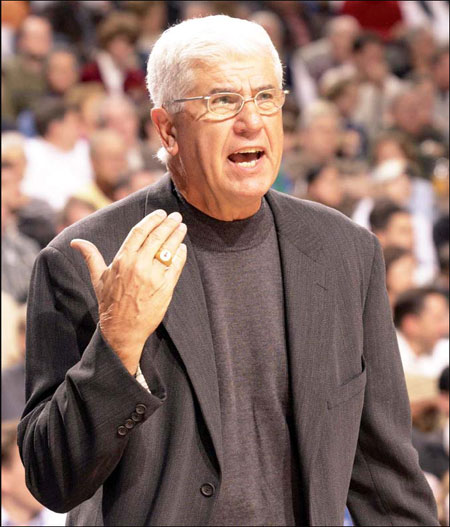Double dribble
Updated: 2012-03-23 11:08
(China Daily)
|
|||||||||||
"We have a great interpreter who really understands basketball, and him understanding the game makes it so much easier to get my point across," he says.
'The mule gets tired'
Del Harris was as successful as any foreign coach has been in China. He led the national team to eighth-place finish in the Olympics in Athens in 2004, and helped modernize the game.
|
 Del Harris led the Chinese national basketball team in the 2004 Olympic Games. Foreign coaches said they have faced tough experiences in China. [Provided to China Daily] |
Before arriving, he dispatched assistants to work on things as simple as weight training and running techniques. "(Those) were sadly lacking before I got there," Harris wrote in an e-mail interview.
"Without that, we would never have achieved the level of success we did in Athens or Beijing. Their (the players) bodies and athleticism had to catch up with those of the Euros and Americans in order to compete before they ever got any coaching in the game."
Coaches are immediately confronted with players who have grown up with different training and different skill sets. Some of it is good. Some isn't.
"The players in China have better hand-eye (coordination), they shoot the ball better and they have softer hands. It's smoother than what I had in Australia," says Goorjian, former coach of the Australian national team.
On the other hand "They don't go at the intensity I like to go at, and when I first came into this, I was furious after every practice," he says.
|
|||
One thing remains universal though: the know-it-all kid. "When young people think they know it all, it's pretty hard to teach them anything new," Cleamons says. "I think they're at the stage where they think they know it, but in thinking they know it their behaviors telling me over and over again 'Well, you're not as good as you think you are.'"
The key seems to be a willingness to adjust. "I think that culturally and historically there's obviously a difference with how we - and when I say we, I include myself, obviously - tailor our approach to the game," Cleamons says. "I think that our expectations are different."
And it doesn't matter how much success a coach has had. He still faces a group of players who can be resentful of a foreigner trying to impose his own system on a sport they've spent a lifetime learning differently. "I think there was 'This guy knows basketball, but you don't get it,'" Goorjian says. "Living, training, the amount of training, when to turn it on, when to turn it off, what's good for us. More foreign (head coaches) have been in here than me, and they've been served up and spit out, so it's not like 'This is the first guy, this is the saving grace.' They've seen that, done that, (it) ain't worked."
Even Harris, who came to China with a glittering resume, wasn't universally accepted. However, having such an impressive background earned him some leeway as he worked to gain the respect of his new team and its fans. "Naturally there were those who preferred a native coach, as they have a right to do," Harris wrote. "There was never any question of credibility. That is why I was chosen. No one chooses a national coach, native or foreign, unless there is some reason for credibility."
Donewald, who still coaches the Chinese national team, was replaced by the Xinjiang Flying Tigers in December and the parting of ways turned ugly. He was sued by the team, which claimed he coaxed one of the players into faking an injury in protest at the termination.
"We have situations where, in this particular (basketball) culture, if you've got a coach that the players don't like, they may not respond to him, and if they know it's easier to fire one coach than get rid of the whole team, then . . ." Cleamons says.
The bottom line is that a coach must find ways to earn players' trust, especially in an environment in which mutiny lurks as a possibility. "Players have to believe in what you're trying to do and that you're the person that can lead them," Cleamons says. "You're the one who's making decisions, and you're the one that someone in authority has said that they want to lead, and so the trust issue is huge at any level."
Goorjian feels comfortable with the Leopards. He credits the commitment shown by the team's owner with building toward lasting success, styling it on the model used by soccer's Manchester United. The plan is to build an infrastructure that will lead to consistent long-term excellence. Cleamons signed a one-year deal and now the season is over, he will see how things shake out.
"I'm having a good time," Cleamons said. "My China experience, as I call it, has been enjoyable. I like the passion for the game over here, I think that it's a basketball league and culture that is definitely on the rise. I think that basketball in China is here to stay, and on the Asian continent, I think that it's a place that in the next years, the sky's the limit."
Sun Xiaochen contributed to this story.
dustylane@chinadaily.com.cn
Today's Top News
Rescuers race against time for quake victims
Telecom workers restore links
Coal mine blast kills 18 in Jilin
Intl scholarship puts China on the map
More bird flu patients discharged
Gold loses sheen, but still a safe bet
US 'turns blind eye to human rights'
Telecom workers restore links
Hot Topics
Lunar probe , China growth forecasts, Emission rules get tougher, China seen through 'colored lens', International board,
Editor's Picks

|

|

|

|

|

|





